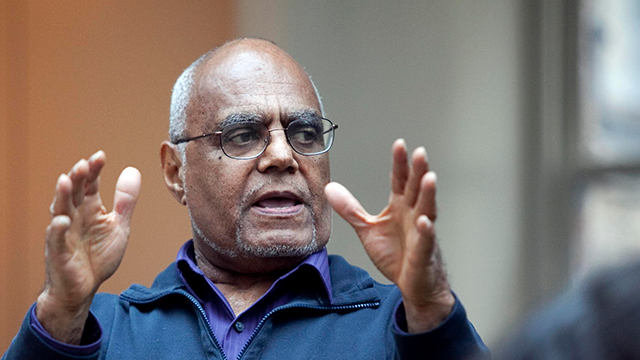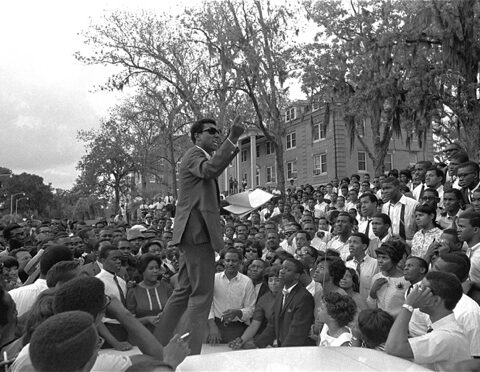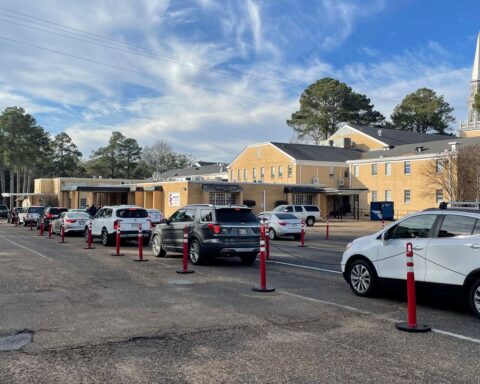by Kayleigh Skinner and Bobby Harrison
Robert “Bob” Parris Moses, a civil rights leader, educational advocate and pioneer in grassroots community organizing whose efforts played a key role in helping Black Mississippians gain basic rights, died Sunday at 86.
On Sunday morning, the Student Nonviolent Coordinating Committee (SNCC) Legacy Project’s 60th Anniversary Conference posted on social media that Moses, a civil rights hero, had died.
“We honor his vision, tenacity, and fearlessness. His deep belief in people who find themselves in the socio/economic bottom made a fundamental difference for millions of his fellow Americans,” the SNCC Legacy Project said in a statement.
Moses, a New York native, was a field secretary for SNCC in Mississippi. He also served as co-director of the Council of Federated Organizations (COFO), which used community organizing as a tool to launch voter registration projects across the state.
COFO served as an umbrella for an alliance between the SNCC, the Congress of Racial Equality and the National Association for the Advancement of Colored People (NAACP) and helped focus civil rights efforts in the state. COFO was known for its young organizers’ door-to-door canvassing, voter registration preparation and workshops, and actual registration attempts in Mississippi.
Through his work with both of these organizations, Moses was instrumental in the Mississippi Freedom Summer, the 1964 voter registration drive created to increase the number of registered Black voters in Mississippi. That summer, white volunteers traveled to the South to work alongside African Americans who were fighting for access to the polls.
“At the heart of these efforts was SNCC’s idea that people—ordinary people long denied this power—could take control of their lives,” the SNCC statement continued. “These were the people that Bob brought to the table to fight for a seat at it: maids, sharecroppers, day workers, barbers, beauticians, teachers, preachers and many others from all walks of life.”
Derrick Johnson, president of the NAACP and a Mississippian, said “Bob Moses was a giant, a strategist at the core of the civil rights movement. Through his life’s work, he bent the arc of the moral universe toward justice, making our world a better place. He fought for our right to vote, our most sacred right. He knew that justice, freedom and democracy were not a state, but an ongoing struggle.
“So may his light continue to guide us as we face another wave of Jim Crow laws. His example is more important now than ever…Rest in power Bob.”
In response to the state Democratic Party denying access to Black Mississippians, Moses, along with Fannie Lou Hamer, Ella Baker and others created the Mississippi Freedom Democratic Party. The effort created national attention at the 1964 National Democratic Convention as conflict developed over whether to recognize the integrated party or the traditional party. New party members ultimately failed at being seated as voting members of the 1964 convention, but their efforts brought new attention to the plight of African Americans in Mississippi and other Southern states and ultimately led to a revolution in the national Democratic Party on racial issues.
“He was a civil rights icon who made sacrifices for what he believed,” said state Rep. Robert Johnson, D-Natchez. “He could have done a lot of things, but he made sacrifices on behalf of the movement.”
In addition to his civil rights work, Moses taught math to students in Tanzania from 1969 to 1976. In 1982, Moses went on to found The Algebra Project. The national organization exists to teach students, especially low income students and students of color, mathematical literacy and prepare them for college.
In 2000, Moses was honored by both the Mississippi House and Senate, whose members in past years had passed laws that he fought to overturn denying voting rights and other basic rights to African Americans.
“One of my greatest honors as a legislator has been to sponsor a resolution honoring Bob Moses for his work with SNCC and, later, with the Algebra Project,” said Sen. John Horhn, D-Jackson. “He was a quiet, meticulous, effective visionary and leader and his contributions to helping Mississippi free itself from the yoke of discrimination and tyranny are incalculable.”
State Rep. Alyce Clarke, D-Jackson, was just this past weekend honored at Jackson State University along with Moses and other civil rights leaders as being part of a mural titled “Chain Breakers.” Clarke was the first Black woman elected to the Mississippi Legislature. She began serving in the state House in 1984. Clarke described Moses “as a brilliant person and somebody who did what he said he was going to do….It was an honor to be included in a mural with him and other civil rights leaders.”
Moses also inspired an exhibit in the Mississippi Civil Rights Museum in downtown Jackson. The museum’s fifth gallery, “A Tremor in the Iceberg,” is inspired by his description of the movement in Mississippi: “A tremor in the middle of the iceberg from a stone which the builders rejected.”
“Staff are saddened to hear of the death of Bob Moses, an American icon who left a tremendous legacy in Mississippi,” said Katie Blount, executive director of the Mississippi Department of Archives and History. “We are honored that he was the keynote speaker during the Medgar and Myrlie Evers Lecture Series in 2014. His commitment to justice is displayed throughout the Mississippi Civil Rights Museum.”





